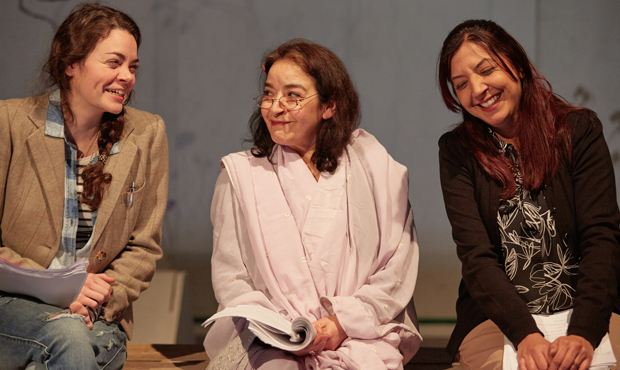Made Visible (The Yard)

© Mark Douet
How does a white playwright do their bit for diversity? That's the problem Deborah Pearson faces down in Made Visible – an attempt to offset her own privilege that is doomed to failure from the start.
For someone to be made visible, someone else has to make it so. Those pushed to the margins of a culture cannot necessarily carve out space in its centre. Instead, someone with an existing platform has to invite their issues and their voices in. Cue cultural appropriation and inauthenticity.
Pearson recounts (or concocts) an encounter on a park bench with an older woman in a saari, Ila (Mia Soteriou). They're both neighbours and strangers, from the same part of the city but different walks of life. It takes a chance encounter for them to cross paths – "almost too much like a play, but a really bad play."
It's a tricksy, self-conscious piece. Pearson is played, quite uncannily, by Haley McGee, and constantly caveats her own writing. As well as faux-pas within the fiction, gabbling the word Gujarati for instance, she comes unstuck as a writer. Even the most honest account of the exchange is still her account, one that places Pearson at the centre, puts words in Ila's mouth and confines an Indian actress to another exoticised bit-part in traditional dress.
How to counter all that? The two actors swap parts – McGee struggling with a saari, both practically and conceptually – and wrestle with the writing. The arrival of a third character Ayesha (Anjali Mya Chadha), a British muslim, also Gujarati, compounds the conundrum.
Of course, it's inescapable – one contrivance on top of another. The actors' asides are just as scripted, just as artificial and inauthentic, as their characters' dialogue, and even when Pearson gives them space to speak freely, opening the script up for interjections and objections, she dictates the terms – one minute, stop – and frames the debate. In the end, all she can speak of is white privilege itself.
However, the point isn't the solution, but the struggle. Pearson exposes – makes visible – the privilege of cultural norms that's so often and so easily overlooked. To do so, she has to problematize it.
That's like watching the world's worst escapologist. Pearson puts herself in a bind and, in attempting to wriggle free, only ties herself in knots. However, rather than enjoying its own failure – and I can't understand why Pearson isn't playing herself, squirming to safeguard her own political correctness – Stella Odunlami's production becomes rather po-faced. It's caveats are not clownish, but pernickety – the constant cavils that becalm council meetings the world over. All credit to Pearson for taking a serious issue seriously, but at a certain point I noticed my teeth had gritted themselves.
In the end, the struggle is simply not enough. If Pearson can’t write the play that affects the change she advocates, why not just find another mode of working? Clear the space for other artists. Produce their work and promote it. Pearson falls foul of her own paradox. Put simply: what else could have staged in its stead? What – and who – is it blocking out?
Made Visible runs at the Yard Theatre until 9 April.










